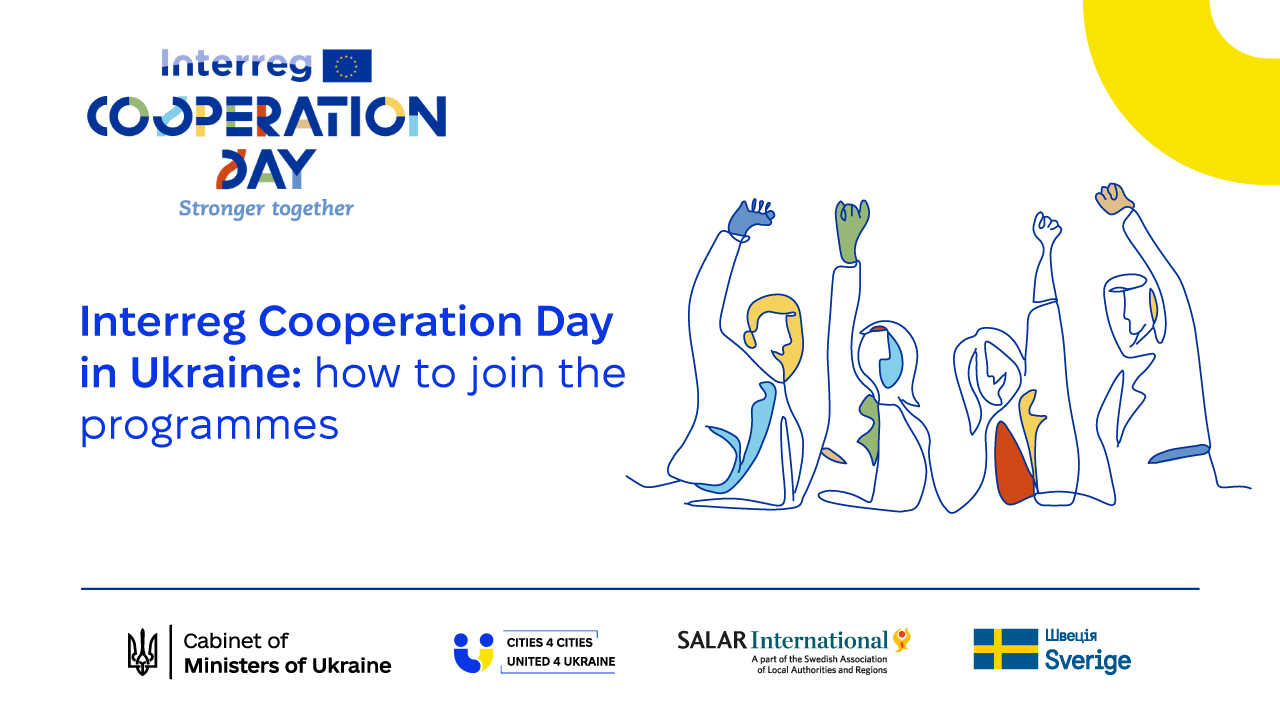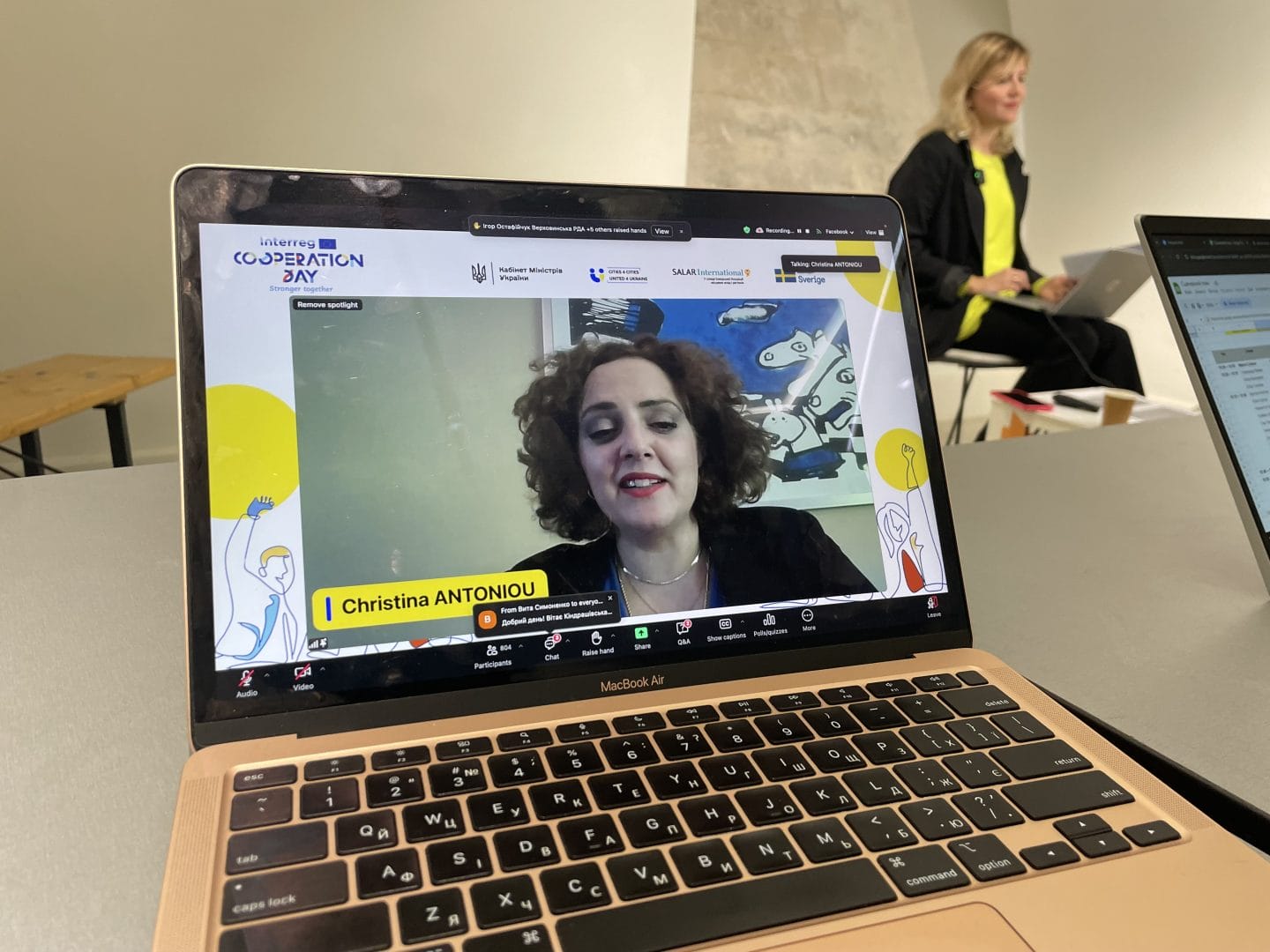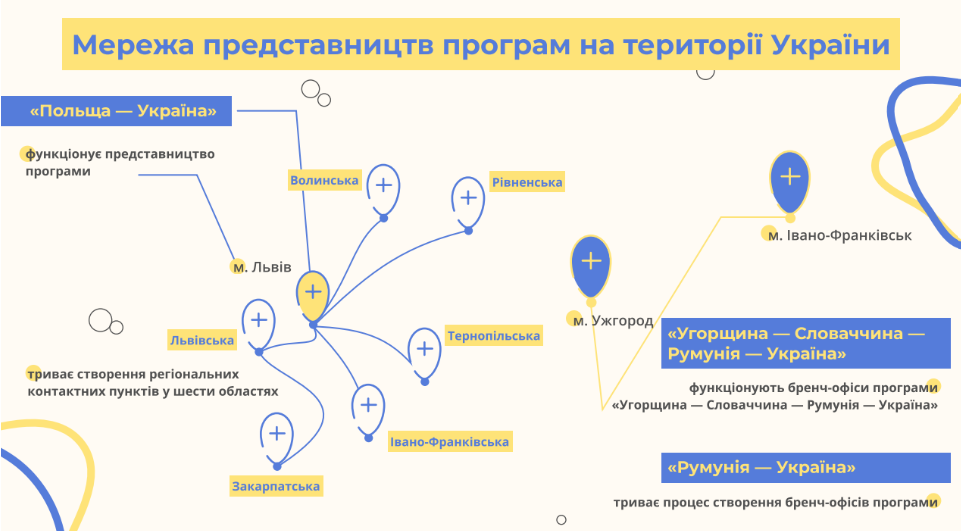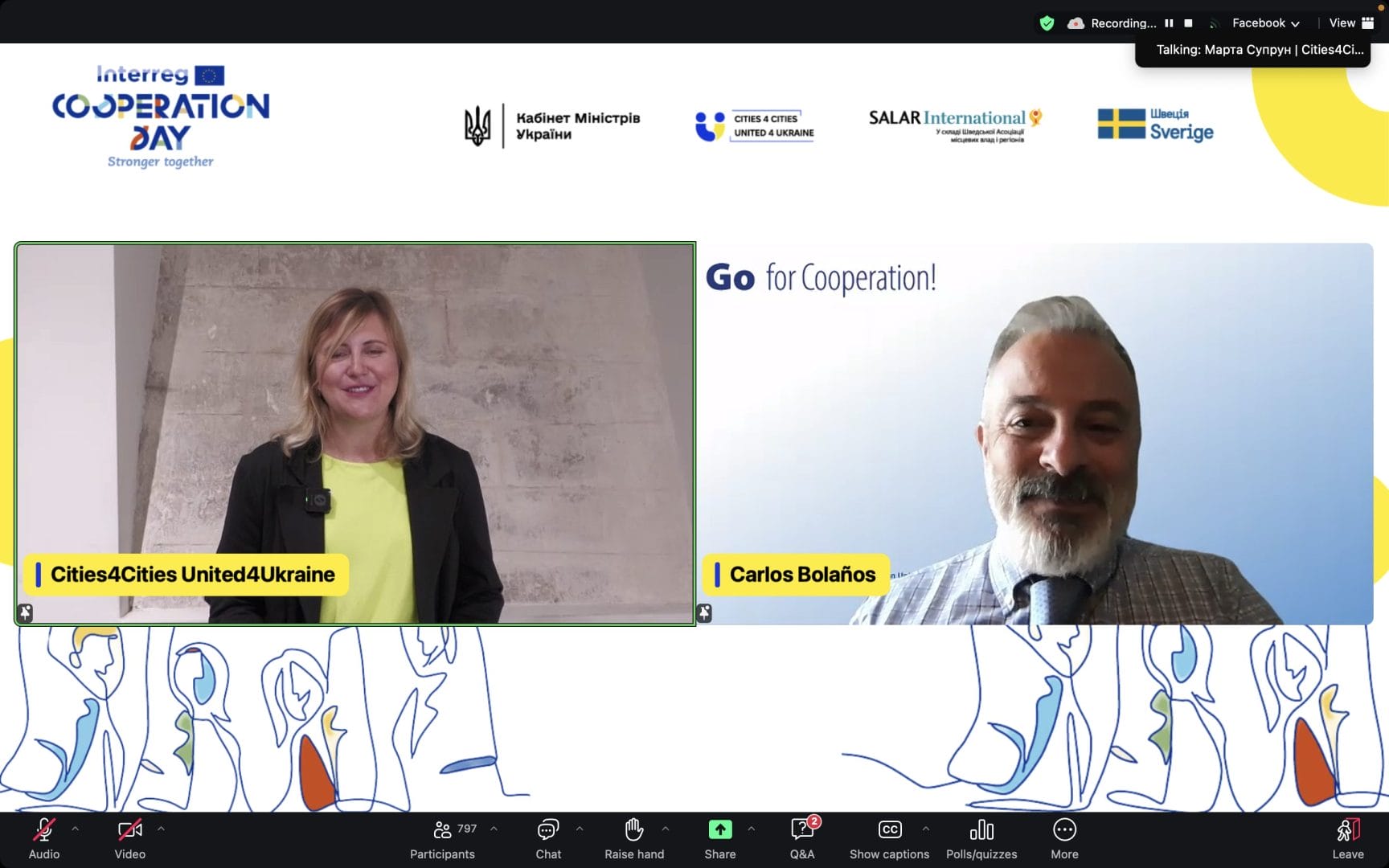This website uses cookies so that we can provide you with the best user experience possible. Cookie information is stored in your browser and performs functions such as recognising you when you return to our website and helping our team to understand which sections of the website you find most interesting and useful.
Interreg Cooperation Day in Ukraine: how to join the programmes

For the first time, Ukraine joined the celebration of the Interreg Cooperation Day on a large scale. The event not only summarized the results, but also shared useful tips.
The article was prepared by Cities4Cities | Untied4Ukraine with the support of the Swedish-Ukrainian Polaris program: Support to Multi-Level Governance in Ukraine
On October 2, the Secretariat of the Cabinet of Ministers of Ukraine, in cooperation with the Cities4Cities | United 4 Ukraine initiative, organized a large-scale celebration of the Interreg Cooperation Day for the first time, which was attended by more than 800 participants – representatives of communities, government agencies, educational institutions, and NGOs. The online event brought together representatives of the European Commission and all Interreg programmes in which Ukraine can participate. During the Cooperation Day, they also presented examples of successfully implemented projects and discussed how to make sure that there are more and more of them on the Ukrainian side.
Interreg – on the way to the EU
The scale of cooperation between Ukraine and the EU in Interreg programmes is growing every year, both in terms of budget and number of projects. Today, there are already 8 programs – 3 cross-border cooperation programs for the border regions bordering the closest EU neighbors – Poland, Romania, Hungary and Slovakia, 2 transnational programs – the Black Sea Basin and the Danube Transnational Program, as well as 3 new interregional cooperation programs that Ukraine joined only this year – Interreg Europe, URBACT and EPSON (as an observer).
In the new 2021-2027 programming period, applicants from Ukraine are already implementing 167 projects worth more than €91 million. And this is not the full amount of investment – the results of several recent calls are expected to be announced by the end of the year. Also, the programs have small project competitions ahead, which are especially suitable for beginners who want to try themselves in Interreg programs. Such projects will help build partnerships and processes that will become the basis for submitting new large projects.
“We will continue to support Ukraine. Within the framework of Interreg programmes, Ukraine has the opportunity to gain experience in working with European funds in general, under the watchful eye of joint secretariats with EU countries, and thus bring Ukraine’s accession to the EU closer,” emphasized Christina Antoniou, representative of the European Union’s Directorate-General for Regional Policy (DG Regio).

In particular, thanks to the projects, Ukrainian organizations have the opportunity to exchange experience with colleagues in such important areas as environmental protection, health care, cultural heritage preservation, civil protection and security, education, culture, and others. Project participants also gain important experience in procurement and reporting in accordance with European requirements.
The geography of Ukrainian partners is also constantly expanding. Thus, during the war, the Danube Program decided to allow organizations to implement projects throughout Ukraine. Likewise, the new Interreg Europe and URBACT programmes are an opportunity for all communities to learn from the best practices of European colleagues and implement innovative approaches to local policy development.
How to implement successful Interreg projects
During the Cooperation Day, they presented examples of successfully implemented projects and discussed how to make sure that there are more and more of them on the Ukrainian side.
In particular, an important aspect of successful participation in Interreg projects is the ability to provide co-financing in the amount of 15-20%. At the same time, project tranches are transferred after interim reporting, and organizations should be prepared to invest additional funds in project implementation before the next tranche is received in order to implement the project on time.
Participation in Interreg projects is a long journey that requires good preparation, including establishing partnerships with relevant organizations in other EU countries. Personal contact with partners is important for establishing partnerships. If you don’t have extensive experience of your own, look for partners who do and who are willing to be the main partners in the project.
Participate in European events
Participate in European events organized by the programmes. The next such event, the URBACT Festival in Wroclaw on April 8-10, will be useful for Ukrainian cities planning to join the URBACT program.
Among the brightest examples, the experience of the Voznesenska community in Mykolaiv region, which is already implementing the Innovative Communication project, aimed at local small and medium-sized enterprises, within the framework of the Interreg Europe programm, is useful.
After the active hostilities in the community, the Voznesensk community realized that the region could not be economically rebuilt without business development and support. Therefore, this soft project of Interreg Europe coincided with the already developed strategies. Its goal is to advise and inform businesses about development opportunities and to share practices among all project partners.
“Our city council representative took part in the Interreg Europe conference, where teams were looking for partner organizations and working on finding new ideas. And thanks to this participation, we strengthened the cooperation with Italian partners that we started with Cities4Cities and actually reached an agreement on the implementation of this project,” said Victoria Baltser, Secretary of the Voznesensk City Council.
The project started in 2023 and includes seven partner countries: Romania, Latvia, Slovenia, France, Ireland, Italy, and, starting in spring 2024, Ukraine. Voznesensk will have its first experience of reporting under Interreg Europe.
Contact the brunch offices of the programmes in Ukraine

To help potential applicants and beneficiaries, the programmes set up their representative offices or brunch offices in the regions participating in the programmes. They are reliable assistants for those who want to participate in project competitions and support projects that are already being implemented. Find out where the brunch office of the program you are interested in is located and keep in touch with them.
Even at the start of the project, it is necessary to think about reporting and final audit and carefully collect supporting documents – not only financial, such as contracts and acts, but also practical evidence of the purchase of goods or services. These can be photos of events and purchased goods, lists of event participants, strategic documents developed within the project, or developed layouts. All Interreg projects in Ukraine are audited by the State Audit Service of Ukraine. The opinions of private auditors are not taken into account.

“We see a lot of enthusiasm and desire from Ukrainian organizations to participate in Interreg programs,” says Carlos Bolanos, head of the TESIM project team of experts providing methodological support to potential applicants, and adds: “It’s always good to have new people join projects. So, if you decide to take this path, don’t be afraid of competition or rules. It can all be done.”
If you want to learn more about the opportunities for community participation in European programs, join the online course “European Integration for Ukrainian Municipalities” on the Cities4Cities Academy educational platform.
For reference:
The Secretariat of the Cabinet of Ministers of Ukraine is the National Managing Authority of the Interreg and Interreg NEXT programs in Ukraine.
Cities4Cities | United4Ukraine are partnership initiatives that joined forces in September 2022. The project helps Ukrainian communities establish inter-municipal partnerships with municipalities in Europe.
United4Ukraine was launched by SALAR International and the city of Lviv with the support of the Swedish International Development Cooperation Agency (Sida). Cities4Cities was founded by the city of Sindelfinden (Germany) under the auspices of the Congress of Local and Regional Authorities of the Council of Europe.
Strategic partners: Association of Ukrainian Cities, All-Ukrainian Association of Amalgamated Territorial Communities.
